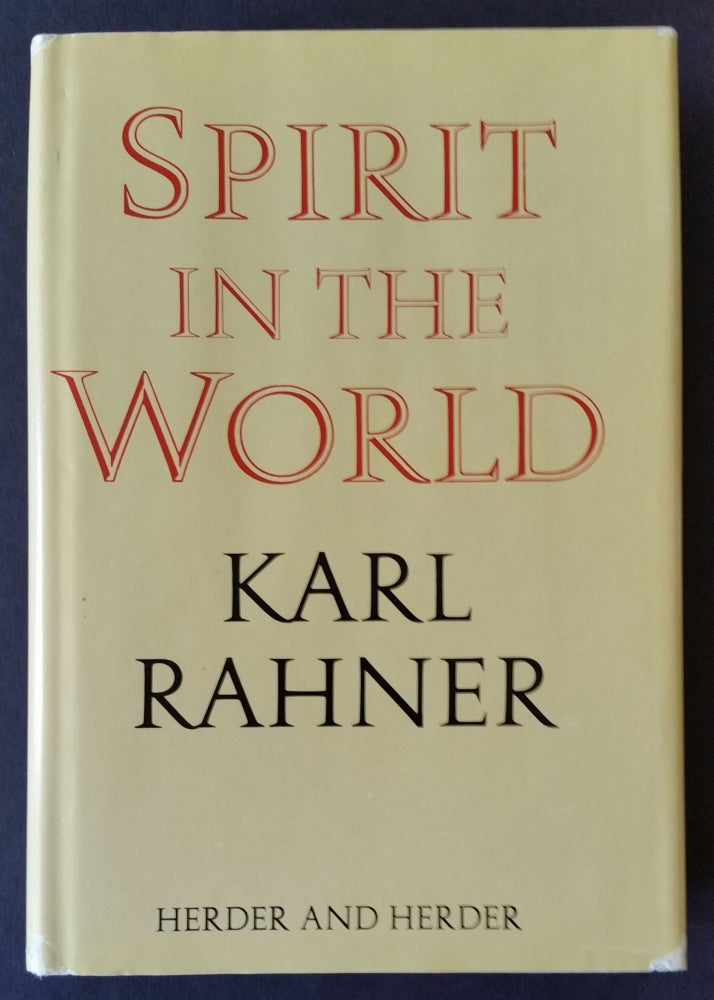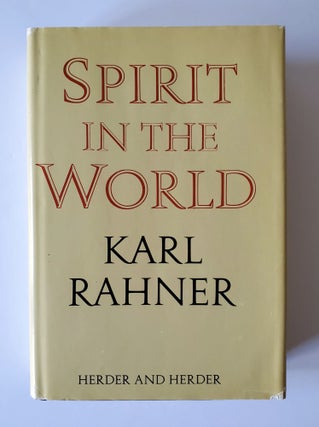Spirit in the World
New York: Herder & Herder, 1968. First English translation. Octavo, original black cloth, original dust jacket. Nearly-fine book with early owner signature to blank flyleaf, price-clipped dust jacket with only minor wear to the corners and spine ends. A near-fine copy. Item #479
"A BRILLIANT AND FAR-REACHING INTERPRETATION OF A SINGLE ARTICLE IN AQUINAS' SUMMA THEOLOGIAE" First edition in English of one of Karl Rahner's earliest books, an important contribution of transcendental Thomism to the development of modern metaphysics. Karl Rahner entered the Jesuits in the early 1920s, joining his older brother Hugo in the Society of Jesus. Spirit in the World was originally completed by Rahner as a doctoral dissertation in 1936. The dissertation was rejected in 'philosophy' by Rahner's director but later accepted in 'theology' and first published in 1939. Rahner joined fellow Jesuits Joseph Marechal and Pierre Rousselot and others in a creative reading of Thomas encompassing contemporary insights from Kant and Heidegger. This transcendental Thomism conflicted with the more traditional approaches and led to theological infighting. But "whatever else may be said about it, Spirit in the World offers a brilliant and far-reaching interpretation of a single article in Aquinas' Summa Theologiae." (Robert Royal, A Deeper Vision).
Spirit in the World was resurrected shortly after the close of the Second Vatican Council, the English translation was based on the second German edition of 1957. This 1968 publication announced a post-conciliar period of great productivity and creativity for the German theologian. "Karl Rahner was probably the most influential figure in Catholic theology in the years immediately following the Council. The sheer brilliance of his two early books (Geist in Welt, 1939) and (Horer des Wortes Hearers of the Word, 1941) quickly brought him to global prominence and contributed directly to several directions taken by the Council, where he served as an adviser. But he loomed even larger in the 1970s and early 80s in Catholic circles, especially in seminary formation, as Catholic instititions of higher learning tried to work out implications of the Council during a turbulent cultural period." (Robert Royal).
The book consists of three main sections: Part One. Introductory Interpretation of Summa Theologiae I, Part Two. Spirit in the World, Part Three. The Possibility of Metaphysics on the Basis of the Imagination. This comprehensive edition is accompanied by a Foreword: An Essay on Karl Rahner (by Johannes Baptist Metz) and a lengthy Introduction: Karl Rahner and the Kantian Problematic (by Francis P. Fiorenza). Fr. Metz was a student of Rahner's and emphasized a distinctly political theology. Rahner's interest in Liberation Theology and his willingness to blend the modern and the traditional led many to view him as a less than orthodox figure but others argue for a different view: "You have to understand Rahner in the fullness of his intention and thinking and simply recognize that it was not his aim to stand against the faith of the Church." (Joseph Ratzinger). Karl Rahner "in the end stood for love of the Church and the wish to be a Jesuit and the will to stand in the original sense of the word in the Society of Jesus, to live and think and so to serve the Church." Translated by William Dych, S.J. Approbations. A definitive edition of arguably Rahner's most important book.
Price: $65.00


